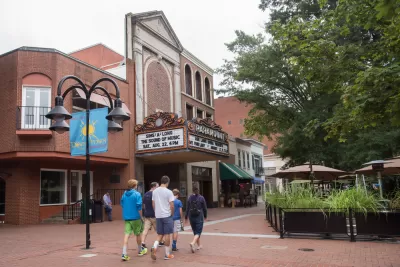A think-piece published by CityLab argues that public space, and the ideals it embodies, are under threat from the racist groups that gathered in Charlottesville, Virginia last weekend.

Kriston Capps penned a think-piece on the "Unite the Right" protests in Charlottesville over the weekend—arguing that the protests represent an attack on the role of public space in a democratic society.
Capps expands the consequences of the vehicular attack on a group of counter protestors on Saturday:
The attack also threatens public space, an amenity that is both scarce and necessary for democracy. The idea of the public square is under attack. And the extremist alt-right is waging a campaign to shut down the public square, using both violence and intimidation, especially under open-carry laws.
Capps details the history of public space as a legal concept, especially one central to the idea of democracy. Charlottesville's Downtown Mall, as designed by Lawrence Halprin, is excellent example of the public square, and it's has "been the site of regular protests since last year, when the city declared its intent to remove a Confederate statue celebrating Robert E. Lee," according to Capps.
Capps argues that the alt-right attack on public space has another weapon to "chill free speech": open carry. "A public square is not possible in states with open-carry laws," argues Capps, noting that Virginia is one example of states that have "ceded law enforcement authority to racist provocateurs."
FULL STORY: White Supremacists Are Waging a War Against Public Space

Maui's Vacation Rental Debate Turns Ugly
Verbal attacks, misinformation campaigns and fistfights plague a high-stakes debate to convert thousands of vacation rentals into long-term housing.

Planetizen Federal Action Tracker
A weekly monitor of how Trump’s orders and actions are impacting planners and planning in America.

In Urban Planning, AI Prompting Could be the New Design Thinking
Creativity has long been key to great urban design. What if we see AI as our new creative partner?

Congress Kills Office Conversion Tax Credit
A federal tax incentive for energy efficiency upgrades is going away next year.

How the ‘Big Beautiful Bill’ Impacts Transportation
Five ways the bill negatively impacts U.S. transportation policy.

California Creates Housing-Focused Agency
Previously, the state’s housing and homelessness programs fell under a grabbag department that also regulates the alcohol industry, car mechanics, and horse racing.
Urban Design for Planners 1: Software Tools
This six-course series explores essential urban design concepts using open source software and equips planners with the tools they need to participate fully in the urban design process.
Planning for Universal Design
Learn the tools for implementing Universal Design in planning regulations.
planning NEXT
Appalachian Highlands Housing Partners
Mpact (founded as Rail~Volution)
City of Camden Redevelopment Agency
City of Astoria
City of Portland
City of Laramie




























